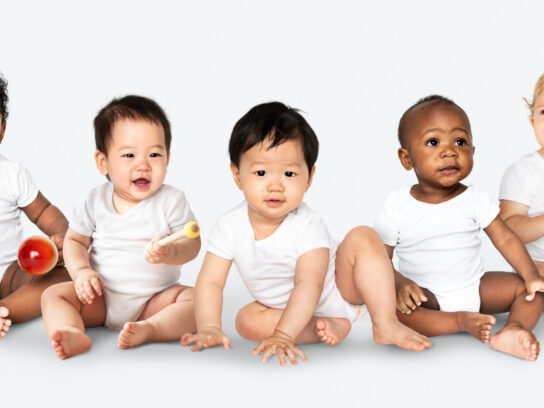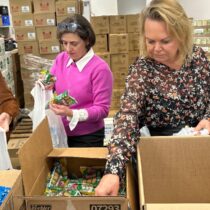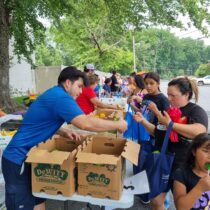
As we head into the winter months, many parents of young babies face a major obstacle. They cannot get their hands on a new medicine designed to protect infants from Respiratory Syncytial Virus (RSV). That is because there is a nationwide shortage of the drug.
CDC Approval of Shot
The Centers for Disease Control and Prevention (CDC) approved a one dose monoclonal antibody called nirsevimab last August for babies eight months old or younger.
The hope was this medicine would prevent the explosion of RSV cases that overwhelmed hospitals across the country last winter. The RSV outbreak occurred at the same time hospitals also dealt with a severe flu outbreak and Covid-19 cases.
RSV Poses Danger to Infants
RSV is particularly dangerous for infants born premature, and for babies with underlying medical conditions. However, healthy babies also can become seriously ill from RSV. The CDC estimates RSV causes about 2 million doctor visits, 80,000 hospitalizations, and about 300 deaths per year.
The pharmaceutical company that makes the drug, Sanofi, said earlier this month, “There has been unprecedented demand for nirsevimab 50 milligram and 100 milligram injections. Despite an aggressive supply plan built to outperform past pediatric immunization launches, demand for this product, in both the 50 milligram and 100 milligram doses, has been higher than anticipated.”
The company announced it was no longer taking new orders for the 100 milligram dose because demand had exceeded the available supply for the current RSV season. That is important because babies who weigh more than 11 pounds can only get the 100 milligram dose. Sanofi said it is carefully managing the distribution of the 50 milligram doses to “provide equitable access.” The company said it is in contact with providers about the distribution plans.
Drug Shortage ‘Troubling’
The RSV season typically runs from October to March, however, some cases did appear last spring.
Dr. Monique Soileau-Burke said the drug shortage is troubling. She is a pediatrician at the Pediatric Center in Columbia, Md. She also is serving as the President of the Maryland chapter of the American Academy of Pediatrics.
“I think it is important to talk about children’s issues because I feel like for many years, we don’t talk about them. These types of things like vaccine shortages, drug shortages, they keep happening to kids,” Soileau-Burke said.
She said children’s issues often are not addressed nor do they get the attention they deserve until the problems become so great, health professionals and other people cannot ignore them any longer. She said part of the problem is “kids don’t vote, and they don’t pay taxes.”
What Is RSV?
RSV is not a new disease. It has been around for a long time and it is highly contagious. However, millions of children did not get exposed to it during the pandemic when parents kept their kids isolated or took other preventative steps to protect them from contracting Covid-19. The reason RSV is so dangerous is because infants younger than six months old have very small airways. RSV often causes inflammation in those air passages. That can lead to wheezing and respiratory distress.
Soileau-Burke said while RSV is a serious disease, babies should recover, and not have any long-term effects from it.
Treating RSV
“The worst days of the illness are from the third through the fifth day. This is the time when you are going to see the most significant respiratory distress or respiratory illness. The rest of the time your child will probably experience more cold like symptoms. You can give your baby some Tylenol; however I would not give acetaminophen to a baby under two months old before first talking to your pediatrician because we want to make sure the fever is not from any other cause,” Soileau-Burke said.
Parents also can use a humidifier, nasal saline drops, and items to suction a baby’s nose to help relieve the congestion. Babies may not feed as long as they normally do, and Soileau-Burke suggests parents feed their babies more frequently but for shorter periods of time. While most babies will bounce back from RSV, the disease could cause complications in babies with underlying medical conditions such as heart or lung issues.
Preventative Steps for Parents
She said parents can take steps to try to prevent their son or daughter from contracting RSV.
“The only things we can do are make sure people are practicing good hand hygiene, washing our hands, limiting exposure to other children who are ill. This shot was a real magic wand for us that we were super excited about. Since there is only one pharmaceutical company making this, we are definitely advocating for the company to increase production. It is very frustrating,” Soileau-Burke said.
RSV Shots for Pregnant Women
There is hope on the horizon. Doctors recommend women who are currently pregnant get an RSV shot between their 32nd and 36th week. The antibodies from the shot will get passed on from a mother to her unborn child. That should provide a layer of protection for a baby when it is born.
“In light of the shortage, it is incredibly and increasingly important that moms get vaccinated,” Soileau-Burke explained.
Hospitals also may give RSV shots to newborns but it is unclear with the current shortage whether that is taking place.
More Information
The CDC has more information about RSV. The link to its website is: https://www.cdc.gov/rsv/index.html
The American Academy of Pediatrics also has information about RSV. Here is a link:


Comments are closed.